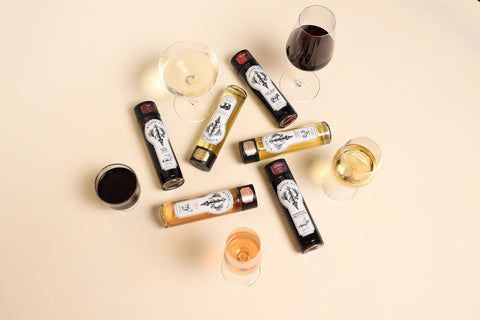Sommelier Training: HOW TO BECOME A SOMMELIER
A sommelier is a wine expert and professional, who typically works in a fine dining establishment. A sommelier has formal training to be able to specialize in all aspects of wine. Today, we're breaking down the different tiers of sommelier training individuals go through to gain this coveted title! First things first, pronunciation. Sommelier is pronounced suh-mel-yay. Just in case, here’s a quick cheat video on pronunciation.
What Does a Sommelier Do?
Sommeliers’ have a variety of responsibilities depending on their level. Specifically in the service industry, a Sommelier is responsible for developing a wine list, training staff on the different wines available, explaining to staff why the wines are on the menu as well as explaining price point rationale. In addition to interacting with the front of the house staff, they are responsible for working with the culinary team to develop recommendations for pairings and fully understanding the opportunities within the menu.

How to Become a Sommelier
Experience, education, and certification are the three most important factors in becoming an expert sommelier. Typically, aspiring sommeliers acquire practical experience in wine-related roles and undergo formal wine education. They then pursue sommelier certification by taking a test or completing formal wine courses followed by an examination. However, you can still take a Sommelier course even without prior wine industry experience. It's also important to recognize that there are various levels of sommelier certification to consider.Levels of Sommelier
Just like higher education (e.g., masters, doctorate, PhD) there are different sommelier levels. The four key levels are: Introductory, Certified, Advanced, and Master. These levels all have different degrees of knowledge needed and build off of one another. A test is taken at the end of each level. If a person passes, then they are considered to be certified at that level.
Different organizations offer sommelier courses, but two of the most well-known include The Court of Master Sommeliers and WSET.
Level 1 Sommelier - Introductory
The Intro Level is typically a weekend-long event. You don’t need to be in the industry to take the course, and it’s fairly simple to find weekend classes that the general public can participate in. The cost varies between $200-$500 with wine theory, wine tasting, label reading, and service commonly covered during the course. To become certified as an Introductory sommelier, you will need to take the class and the corresponding test following that class, and then pass the test.
Level 2 Sommelier - Certified
An individual can take Level 2 coursework to become a Certified sommelier once they have completed and passed the Level 1 Intro class and test. The Level 2 Certified tier is more time and labor-intensive. It’s typically industry professionals, wine enthusiasts, or folks who want to be in the wine industry that partake in this level.
It’s administered in two formats, over an 8-10 week period of time that is a part-time, or over a 1-2 week full-time intensive immersion course. Similar to the introductory Level 1 sommelier course, you have a tasting process, wine theory, and service component, all of which within this setting go much more in-depth. For example, in the service component, you will master the perfect restaurant pour and open wine bottles in the most professional manner. As part of the tasting component, you analyze up to 80 different wines, which is super fun but also very challenging!
Level 3 Sommelier - Advanced
This level of sommelier training is really for the professionals pursuing a career in the industry. To become an Advanced sommelier, the candidate must attend a three-day Advanced sommelier course. Upon completion, they sit for a three-day Advanced sommelier assessment. It’s an extremely rigorous testing process at this level with only about a 25% pass rate. In our opinion, the Advanced sommelier title is an underrated title. There’s a lot of buzz around Master sommeliers but Advanced sommeliers also endure rigorous testing and typically fly under the radar compared to Master Somms.
Level 4 Sommelier - Master
At the top of the pyramid, the cream of the crop, a Master sommelier is a wine expert and professional who has passed the fourth and final level of the sommelier certification. Less than 300 people globally wear this title. The course and exam span over a 3-year period. The final testing consists of a written theory section, a verbal blind tasting section, and an actual practice wine service section. Thinking about the verbal blind-tasting section is beyond impressive. A Master sommelier can pinpoint the region, varietal, and actual year in which the vintage was released. Extremely impressive!!
This is perhaps the level you are most familiar with thanks to documentaries like Somm and Somm Into the Bottle. If you gain this certification you are considered THE top professional in the industry. These experts can spend around 10,000 hours preparing for this sommelier certification. Many Master sommeliers will go on to be judges of international wine competitions.

Reasons to Become a Sommelier
The reasons people choose to become sommeliers can be both personal and professional. For example, individuals may pursue a sommelier Certification for the following reasons:
- Passion for wine and desire to deepen knowledge.
- Advance their profession in the hospitality or wine industry.
- Enhance their career opportunities and earning potential.
- Build credibility and expertise in wine service and education.
- Network with industry professionals and wine enthusiasts.
- Enjoy the challenge and fulfillment of mastering a specialized skill.
- Explore diverse wine regions, varietals, and tasting techniques.
- Provide exceptional wine experiences for customers or clients.
- Pursue a lifelong learning journey in the world of wine.
- Open doors to opportunities such as judging wine competitions or writing about wine.
Dana Spaulding, Founder + CEO of Wander + Ivy, is a Level 2 - Certified sommelier.
When Dana first came up with the business idea for Wander + Ivy she spent 6-9 months working on her business plan before quitting her day job. As soon as that was complete, she quit her full-time role and enrolled in a Level 2 sommelier course. For her, since she was new to the industry, having that foundational knowledge was incredibly important. It was a bit intimidating not being someone who was actively working in the industry, but it helped her gain immense knowledge and perspective to build Wander + Ivy into what it is today!
Start Your Sommelier Training
We hope this provided you with education and inspiration on sommelier training. It’s a unique experience that can be something great to add to your future bucket (or career) list! We recommend checking out the SOMM Films movies to watch on sommelier training and wine experiences in general. Additionally, as summer beach reading season approaches, Cork Dork is a great read about an individual's journey through sommelier certification! Cheers!

Shop all of our single serve wines made with organic grapes on our online wine shop.

